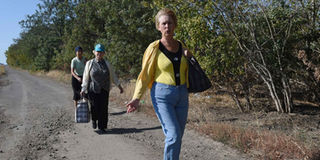EU slaps new sanctions on Russia despite truce

Women walk back to their village yesterday on the outskirts of the southeastern port city of Mariupol, after a ceasefire was signed on September 5, 2014 between Ukraine and pro-Kremlin insurgents. The guns remained silent over eastern Ukraine on September 6, 2014. Pro-Russian rebels, however, accused Kiev’s forces of breaking the ceasefire. PHOTO | PHILIPPE DESMAZES |
What you need to know:
- Action tightens July measures taken after Malaysian plane was shot down in Ukraine in July
- The “enhanced measures” cover the same four areas as the previous set in July: capital markets, defence, dual-use goods with both military and civilian capabilities, and oil technology, Van Rompuy and Barroso said.
BRUSSELS, Saturday
The European Union said Friday it had agreed on a tough new package of economic sanctions against Russia, despite a ceasefire between government forces and pro-Kremlin rebels in Ukraine.
The sanctions tighten existing measures imposed in July, targeting more individuals with travel bans and asset freezes, as well as tightening access to capital markets for Russian oil and defence companies.
European Council President Herman Van Rompuy and European Commission chief Jose Manuel Barroso said in a letter to European leaders that the new measures were an “effective tool” to “reinforce the principle that EU sanctions are directed at promoting a change of course in Russia’s actions in Ukraine”.
US President Barack Obama and British Prime Minister David Cameron had both said at a Nato summit in Wales on Friday that the sanctions should go ahead in spite of the truce signed in Belarus on Friday.
But they both said that the sanctions could be lifted if there was evidence that Russia was taking steps to solve the situation in Ukraine.
The new EU sanctions will be formally implemented on Monday, although the full details of the people and organisations targeted will not be released for another day, diplomats said.
FRESH SANCTIONS
Leaders of the 28-nation EU had asked officials at a summit last Saturday to draw up fresh sanctions after alleging that Russia had sent troops and tanks to support a rebel counteroffensive in Ukraine, a claim Moscow denies.
Five months of fighting in Ukraine has killed some 2,600 people.
The new blacklist targets more people linked to the rebel leadership in the Donbass region of eastern Ukraine, the government of Crimea, which was annexed by Russia in March, and Russian “decision-makers and oligarchs”, Van Rompuy and Barroso said.
The “enhanced measures” cover the same four areas as the previous set in July: capital markets, defence, dual-use goods with both military and civilian capabilities, and oil technology, Van Rompuy and Barroso said.
But EU diplomats said they went further in restricting the access that Russian defence and oil firms would have to raising vital capital in European markets.
An EU diplomat told AFP: “This is evidence that EU governments are prepared to do what it takes to show Russia the consequences of its actions.”





